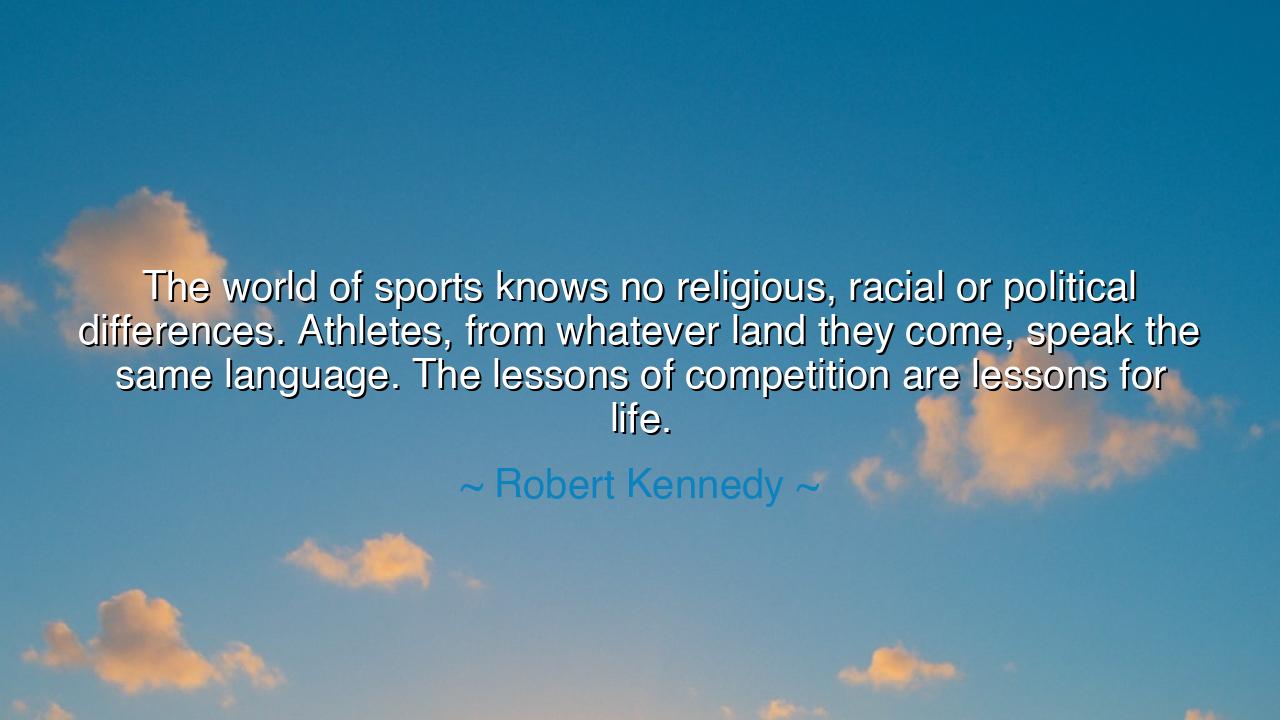
The world of sports knows no religious, racial or political
The world of sports knows no religious, racial or political differences. Athletes, from whatever land they come, speak the same language. The lessons of competition are lessons for life.






Robert Kennedy once proclaimed: “The world of sports knows no religious, racial or political differences. Athletes, from whatever land they come, speak the same language. The lessons of competition are lessons for life.” These words, spoken in an age of division, stand like a torch held high in the darkness. They remind us that beyond the barriers of creed, color, and nation, there exists a universal bond: the striving of the human spirit expressed through sports. Kennedy’s vision was not of games alone, but of a field where humanity can glimpse its unity, where the lessons of struggle, respect, and resilience become a common inheritance.
At the heart of this teaching is the truth that sports transcend boundaries. A man from the deserts of Africa and a woman from the snows of Scandinavia may meet on the same track, speaking no common tongue, yet they understand each other in the rhythm of running, in the discipline of training, in the fire of competition. The rules of the game are the shared grammar, the pursuit of excellence the shared vocabulary. This is why Kennedy speaks of a language—a silent language of effort and courage, spoken by the body but heard by the soul.
History offers shining examples of this truth. Consider the 1936 Berlin Olympics, where Jesse Owens, a Black American, won four gold medals before the eyes of Adolf Hitler, who preached the false gospel of racial superiority. In that moment, the language of sport shouted louder than propaganda. Owens’ victory was not only personal triumph but a universal declaration: that athletic greatness knows no race, that human dignity cannot be bound by hate. The stadium that day became more than an arena—it became a temple of truth.
Kennedy’s words also remind us of the lessons of competition. To compete is to learn humility in defeat and grace in victory, to respect rivals even as you seek to surpass them. These are not merely the rules of games but the rules of life. A nation, like an athlete, must learn discipline to prosper; a community, like a team, must learn unity to endure. Those who cheat or belittle others may win briefly, but they lose the deeper prize: the honor that sustains beyond the contest. Sport teaches us to strive, but also to respect the striving of others, for their journey is a mirror of our own.
The ancients, too, knew this truth. At Olympia, wars between Greek city-states paused so that athletes might compete in peace. Enemies on the battlefield became equals in the arena, bound by the sacred truce. For a brief time, political divisions dissolved, and the shared pursuit of excellence reminded them that they were not merely Spartans or Athenians, but Greeks, and beyond that, human beings. Kennedy’s vision draws from this same well—that sport has the power to reveal our common humanity, even amid division.
Yet, let us not be naïve. The world often seeks to corrupt this purity, to turn sports into tools of politics, commerce, or exclusion. Kennedy’s words are therefore not only description but exhortation: a call to preserve the sacred space of sport as a field of unity. When athletes kneel together, when rivals embrace after the final whistle, when nations cheer for brilliance regardless of origin, we see glimpses of what the world might be if it remembered that humanity’s deepest identity is shared.
Thus the lesson is clear: treat the arena of sports as a school for life. Let the values you see there—discipline, fairness, respect—guide your steps beyond the field. Celebrate not only the victory of your own, but the greatness of others, even of rivals. For if you can learn to see an athlete first as a fellow human being, unbound by race, religion, or nation, then you can learn to see all people in the same way.
So I say to you: carry Kennedy’s wisdom in your heart. Wherever you go—into your work, your community, your nation—remember that competition can divide or unite, depending on how we embrace it. Choose the path of unity. See in every opponent not an enemy, but a teacher. Let the shared language of sports remind you that the world, fractured though it seems, has always had the capacity to be one. And if we can learn this on the field, then surely we can learn it in life.






AAdministratorAdministrator
Welcome, honored guests. Please leave a comment, we will respond soon